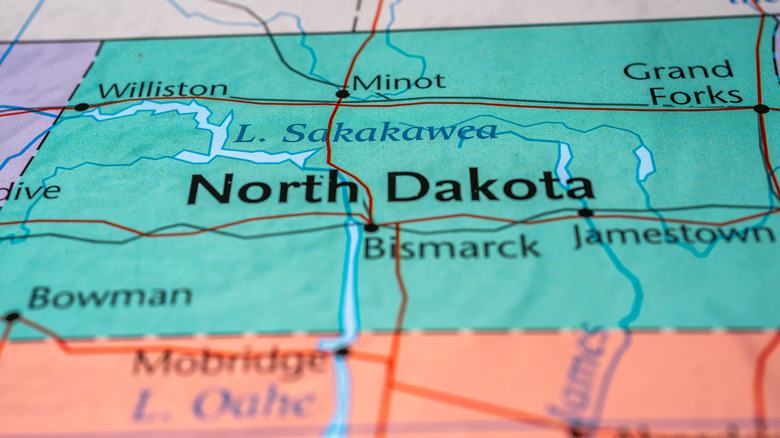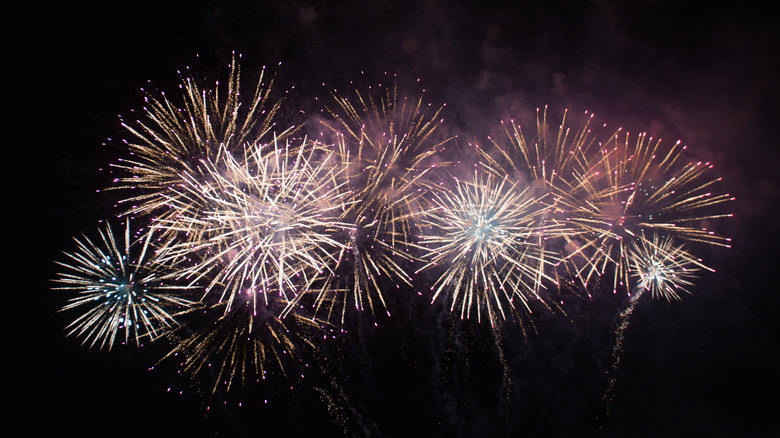Weirdest Laws In North Dakota's State History
North Dakota isn't necessarily the most memorable state. Its claims to fame are quieter than what you might find in New York or California, where major metropolitan areas draw visitors from around the world. Instead, North Dakota's tourism agency highlights landmarks such as the geographical center of North America, sprawling grasslands, and a highway lined with impressive sculptures made out of scrap metal.
But the state, just like the rest of the country, is governed by an evolving code of laws and regulations. And those rules get more niche and specific as you focus on any county or city government. Some of them might seem a little archaic or outlandish, but there's likely a reason or story behind each one — even if we don't know what it is anymore. If you ever plan to visit North Dakota, here are some of the stranger laws you might want to keep in mind.
Don't celebrate too much
Plenty of states and municipalities rightly limit the sale and use of fireworks to promote safety and proper use. In the town of Devils Lake, North Dakota, the sale of fireworks is reportedly limited to just two weeks out of the year: June 28 through July 5 and December 26 through January 1 (via Municode). That should cover the needs of the two major holidays where fireworks are common, anyway, although anyone hoping to celebrate during the rest of the year is out of luck.
But a more specific law might put a damper on your New Year's Eve celebration, too. The municipal code for Devils Lake limits firework use to the hours of 8 a.m. to 11 p.m. during on the approved dates. So if you're hoping to put on any flashy displays to bring in the next year, you'll have to do it a little earlier in the evening — or get out of town for the night.
Take your wine to-go – sometimes
North Dakota's state code includes plenty of restrictions on who can sell alcohol and what they can accept as currency. But there are a few ways to take your drinks home with you – at least sometimes. North Carolina Century Code includes an article that allows you to take your wine home with leftovers from dinner, but only under certain circumstances.
According to the state's code, a restaurant can sell off an opened bottle of wine that has been partially consumed with a meal. But the bottle has to be recorked and sealed in a way that would make it obvious if the bottle had been reopened, likely to keep you from drinking it on the drive home. And not every restaurant can do it — it's limited to restaurants that sell a certain amount of food alongside their alcoholic offerings. The law also specifies that a receipt needs to be issued for the transaction.
Some pets allowed
It's not uncommon for cities to restrict the ownership of exotic or dangerous pets, but some areas take it even further. In Fargo, North Dakota, the city code reportedly states that no resident can keep rabbits or guinea pigs "within an enclosure within the city" (via Municode). Though they aren't exotic or dangerous, the little furry friends can apparently be nuisance enough to require legislating.
But in Grand Forks, North Dakota, it's not the animal restrictions that might make you raise your eyebrows. Instead, the city code specifically outlines that while pigs, cattle, horses, and similar large animals aren't allowed in city limits, there is one unusual pet that's allowed to stick around. According to NC Code § 11-0216, "registered purebred miniature Vietnamese potbellied pigs" are perfectly legal within city limits. Other miniature pigs managed to get approval from the city, too, as long as they're more than six months old and 100 pounds or less.
When do you open?
Businesses in North Dakota are getting used to operating on Sunday mornings. That isn't by choice, though — a previous law used to limit business operations to the afternoons, according to KVRR. If that sounds a little bit archaic to you, you might be surprised to learn it was active right up until 2019. And according to Inforum, it was a contentious law even then, as it opened a debate about religious observations of the day and businesses' freedom to operate when they want to.
Before the laws were repealed, it was classified as a misdemeanor for most businesses to operate between midnight and noon on Sundays (via Justia). And even now, some things are still prohibited to certain hours, such as the sale of alcohol and liquor. But now, many of the general stores and convenience stores can open at whatever time they would in any other state (if they want to, that is).
This club is for residents only
Fans of peas and lentils are likely aware of the USA Dry Pea and Lentil Council, and North Dakota went the extra mile and made its own local branch in 1997 (via Insider). But if you're looking to get involved, you might have to consider moving to the state. According to Insider, the state's laws require that all members of the council be residents of North Dakota.
These laws might seem overly specific or even a little ridiculous, but North Dakota isn't the only place that has these types of regulations. Nearly every state in America has some unexpected laws restricting public behavior, from Alaska to Florida and everywhere in between. As the rulebooks are reviewed and updated, some of them might undergo changes or go away completely — but until then, be sure to keep them in mind if you live in or visit North Dakota!





